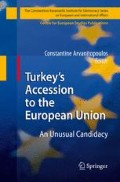The European Union (EU)-Turkey accession talks are taking place against a backdrop of a very sceptical EU public, as well as an elite majority that is less tolerant of Turkey’s European prospects than in the past. This is why Turkey negotiates its European future under the most stringent terms any candidate has ever had to endure in the history of European integration and why, to have any chance for success, Turkey will have to win the hearts and minds of EU citizens. This must be done, however, by a country in a time of peril. Domestic developments in Turkey seem to be of a structural nature, threatening age-old certainties in the country. For Greece, the challenge is enormous as well. Real progress by Ankara in this context would anchor Turkey ever more closely to Europe and lend greater stability to Greek-Turkish relations, leading eventually to a full normalisation of relations between the two countries. The mainstream argument in Greece is that there is a need - in both countries - for a more ‘strategic’ approach towards each other. Both countries have a longer-term strategic interest in seeing Turkey’s EU vocation succeed. Turkey’s successful adjustment to Europe has the potential to alter Greece’s perception of threat, and foster political and economic reform in a Turkey reassured about its place in Europe.
Access this chapter
Tax calculation will be finalised at checkout
Purchases are for personal use only
Preview
Unable to display preview. Download preview PDF.
References
Akcakoca, A. (2006). EU-Turkey relations 43 years on: Train crash or temporary derailment? (Issue Paper 50). Brussels, Belgium: EPC, November.
Akcapar, B., & Chaibi, D. (2006). Turkey's EU accession: The long road from Ankara to Brussels. Yale Journal of International Affairs, 1(2), 50–57.
Cagaptay, S. (2007). How will the Turkish military react? (Europe-ARI 80/2007). Madrid, Spain: Real Instituto Elcano, July 16.
Carkoglu, A. (2002). The rise of the new generation pro-Islamists in Turkey: The Justice and Development Party phenomenon in the November 2002 elections in Turkey. South European Society and Politics, 7(3), 123–156.
Chislett, W. (2007a). Turkey's military throw down the gauntlet (Europe-ARI 51/2007). Madrid, Spain: Real Instituto Elcano, 7 May.
Chislett, W. (2007b). Turkey's election: Islamists deal a blow to the secular establishment (Europe-ARI 86/2007). Madrid, Spain: Real Instituto Elcano, 24 July.
Ifantis, K. (2007). Turkey in transition—Opportunities amidst peril. Journal of Southern Europe and the Balkans, 9(3), 223–231.
Jenkins, G. (2003). Muslim democrats in Turkey? Survival, 45(1), 45–61.
Khalilzad, Z., Lesser I. O., & Larrabee, S. (2000). The future of Turkish-Western relations: Toward a strategic plan. Santa Monica, CA: RAND.
Oktem, K. (2007). Harbingers of Turkey's second republic. Middle East Report Online.Retrieved from http://www.merip.org/mero/mero080107.html/, 1 August.
Öniş, Z. (2005). Turkey's encounters with the new Europe: Multiple transformations, inherent dilemmas and the challenges ahead. Unpublished paper presented at UACES Conference, Zagreb, Croatia.
Ozel, S. (2003). After the tsounami. Journal of Democracy, 14(2), 80–94.
Rumelili, B. (2003). Liminality and perpetuation of conflicts: Turkish-Greek relations in the context of community-building by the EU. European Journal of International Relations, 9(2), 213–248.
Tsakonas, P., & Dokos, T. (2004). Greek-Turkish relations in the early twenty-first century: A view from Athens. In L. G. Martin & D. Keridis (Eds.), The future of Turkish foreign policy. Cambridge, MA: MIT Press, pp. 101–126.
Editor information
Editors and Affiliations
Rights and permissions
Copyright information
© 2009 Constantinos Karamanlis Institute for Democracy, Athens
About this chapter
Cite this chapter
Ifantis, K. (2009). Whither Turkey? Greece's Aegean Options. In: Arvanitopoulos, C. (eds) Turkey's Accession to the European Union. The Constantinos Karamanlis Institute for Democracy Series on European and International Affairs. Springer, Berlin, Heidelberg. https://doi.org/10.1007/978-3-540-88197-1_12
Download citation
DOI: https://doi.org/10.1007/978-3-540-88197-1_12
Publisher Name: Springer, Berlin, Heidelberg
Print ISBN: 978-3-540-88196-4
Online ISBN: 978-3-540-88197-1
eBook Packages: Humanities, Social Sciences and LawPolitical Science and International Studies (R0)

